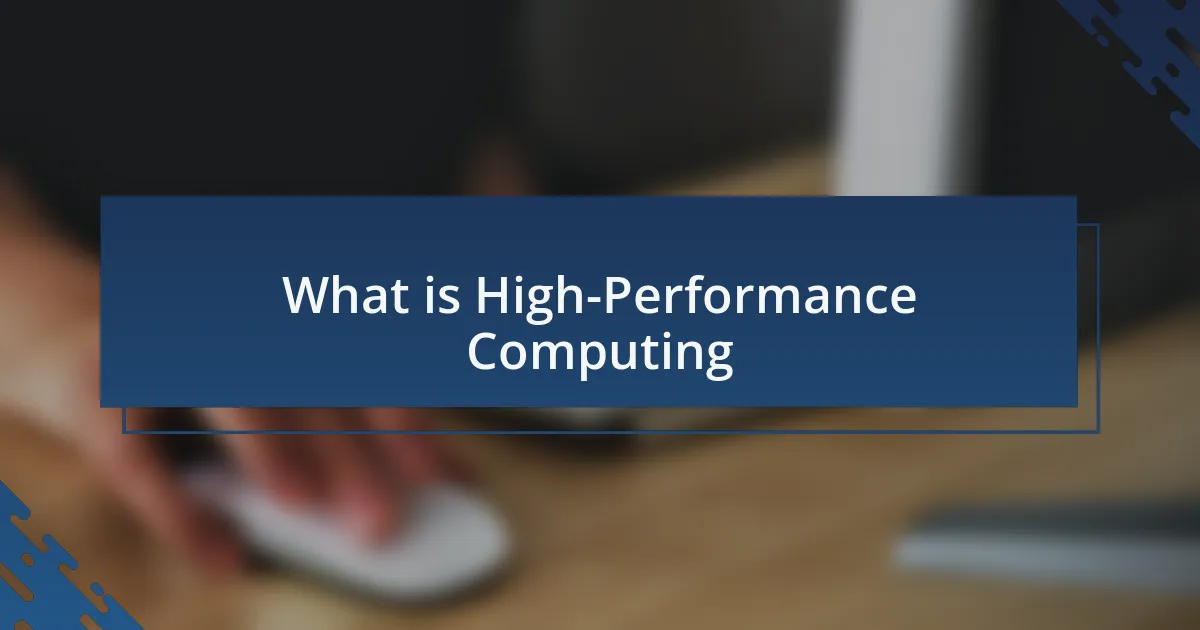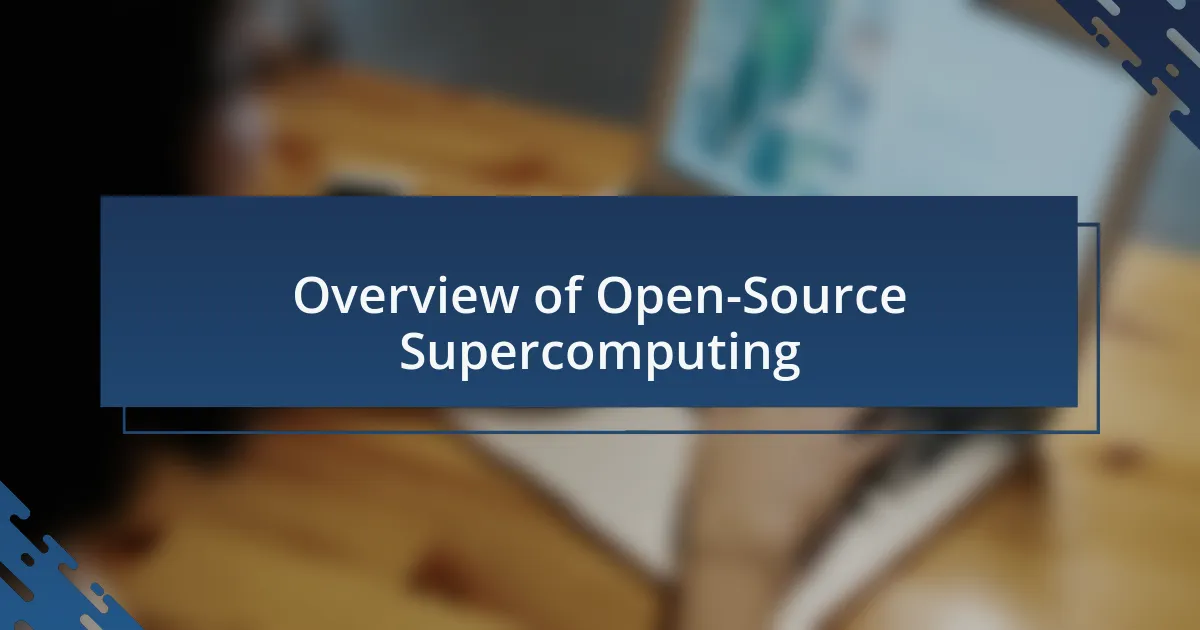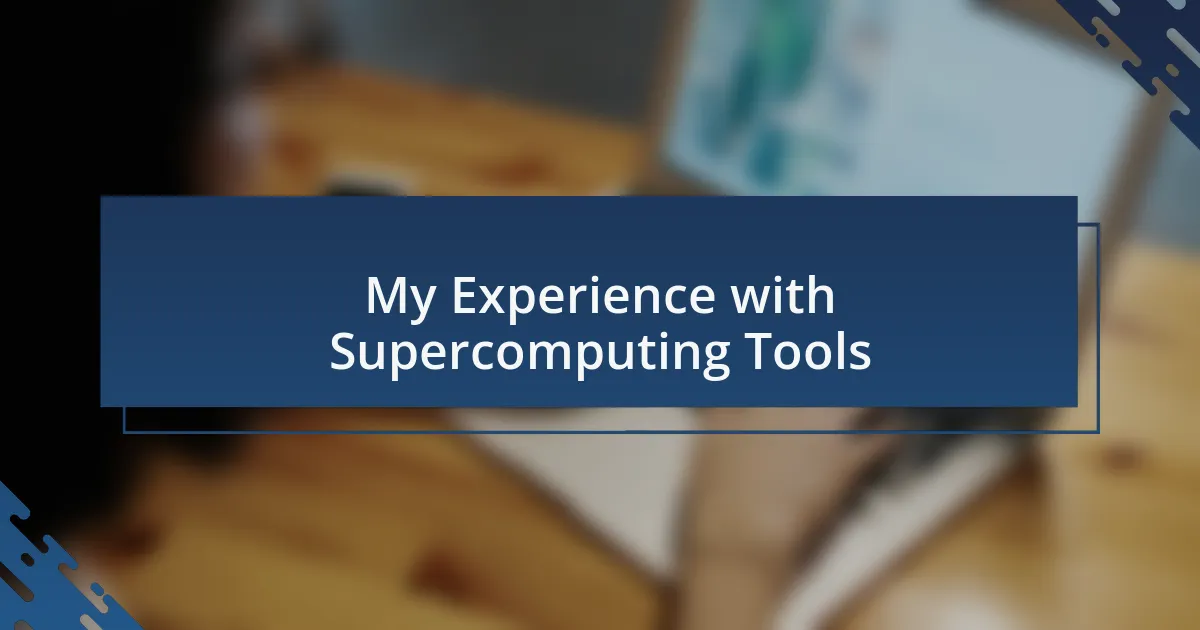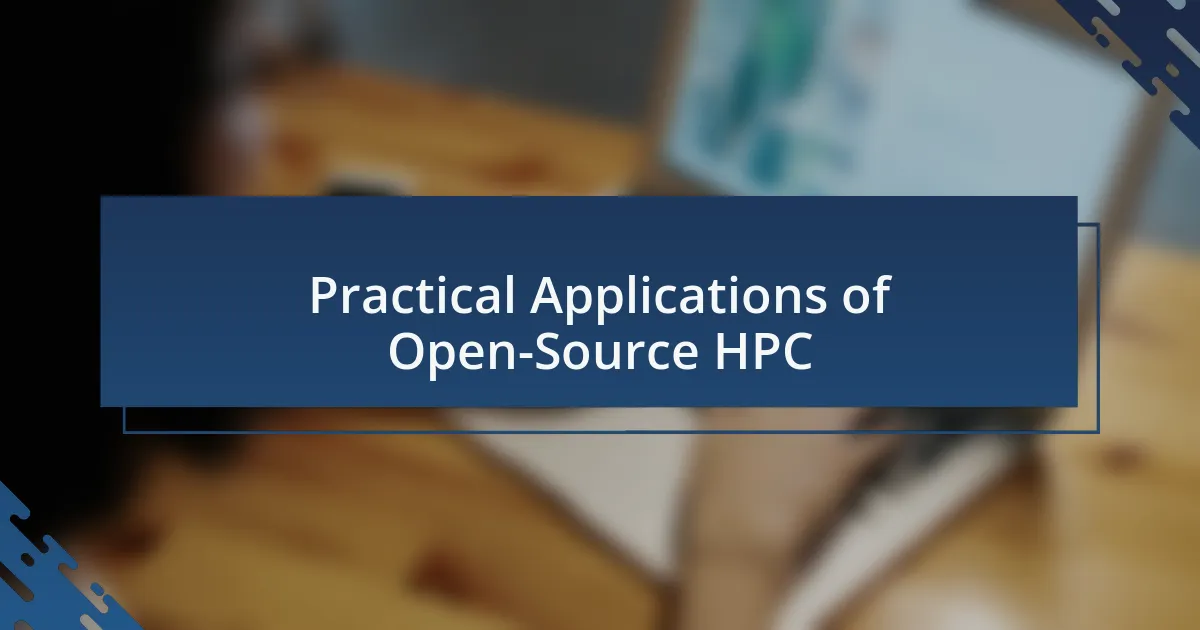Key takeaways:
- High-Performance Computing (HPC) enables complex calculations and data analysis at unprecedented speeds, transforming various industries and leading to significant discoveries.
- Open-source tools democratize access to HPC, fostering collaboration and innovation while promoting transparency and ethical practices in computing.
- Practical applications of open-source HPC include climate modeling and bioinformatics, significantly impacting research and advancements in healthcare and environmental science.
- Effective supercomputing requires methodical problem-solving, consistent software environments, and active engagement with the user community for collaborative learning and support.

What is High-Performance Computing
High-Performance Computing (HPC) stands at the intersection of advanced technology and computational needs, enabling us to carry out complex calculations at unprecedented speeds. Think about it: when I first delved into the realm of HPC, I was fascinated by how it could model weather patterns or simulate molecular interactions in ways that were simply unattainable with ordinary computing power. The sheer capability of HPC makes it indispensable across various fields, from scientific research to financial modeling.
The heart of HPC lies in its ability to process and analyze vast amounts of data simultaneously, using clusters of powerful processors working in tandem. I vividly remember the excitement of collaborating on projects where we could break down enormous datasets—something that felt akin to unveiling a treasure chest of knowledge just waiting to be explored. How exciting is it to realize that HPC can lead to groundbreaking discoveries, such as new drug formulations or advancements in renewable energy?
In essence, High-Performance Computing is not just about raw power; it’s about unlocking potential. Have you ever wondered how long it would take to perform complicated simulations without HPC? It could take weeks or even months, whereas today, we can achieve results in mere hours or days. This remarkable shift has transformed industries and the way we tackle massive challenges, fueling my passion for this field even more.

Importance of Open-Source Tools
Open-source tools are vital in the realm of High-Performance Computing because they democratize access to powerful technology. I remember the first time I stumbled upon an open-source software that enabled me to run complex simulations without the hefty price tag of proprietary products. It was a game-changer, allowing not just large institutions but also smaller teams and individual researchers to harness the power of HPC. Can you imagine a world where knowledge is locked behind paywalls?
Furthermore, open-source tools foster collaboration and innovation in a way that proprietary solutions often can’t match. I’ve participated in projects where contributors from diverse backgrounds pooled their expertise to enhance an open-source tool, leading to rapid advancements and real-world applications. Each update brought a fresh wave of excitement, reminding me that we’re all part of a larger community pushing the boundaries of what’s possible. Isn’t it incredible how shared knowledge can accelerate progress?
Lastly, the transparency of open-source tools builds trust within the HPC community. When working on sensitive data or critical simulations, knowing that the software is open for scrutiny is reassuring. I once led a project that relied on an open-source framework, and I found great comfort in its transparency—it allowed us to evaluate and optimize our workflows thoroughly. Doesn’t it feel good to know that we can utilize tools that not only empower us but also promote ethical practices in computing?

Overview of Open-Source Supercomputing
Open-source supercomputing is a fascinating landscape where creativity meets computing power. I vividly recall diving into an open-source cluster management tool that transformed the way I approached resource allocation. It was like opening a treasure chest filled with possibilities; suddenly, I could optimize computing resources on-the-fly, effectively reducing waste and improving efficiency. Have you ever experienced that rush of empowerment when you realize you can directly influence your work environment?
The collaborative spirit inherent in open-source supercomputing projects is truly remarkable. I once joined a project aimed at optimizing algorithms for simulations, and the level of expertise and creativity I encountered was nothing short of inspiring. Each team member brought their unique perspective, and together we crafted solutions that I never would have imagined on my own. Isn’t it extraordinary how collaboration can lead to breakthroughs that single-minded efforts might miss?
On the technical side, the adaptability of open-source frameworks allows for quick iterations and improvements. I found myself tweaking parameters and experimenting with configurations during a critical simulation run. The flexibility to modify the code to fit specific needs not only saved time but also opened doors to innovative approaches. How often do you get the chance to adapt tools as your project evolves? That sense of ownership and control over the software was invigorating for me, reinforcing why I believe in the power of open-source in supercomputing.

My Experience with Supercomputing Tools
When I first started using supercomputing tools, I remember feeling a mix of excitement and intimidation. I experimented with a popular open-source software package for parallel computing, which was essential for managing large datasets. The moment I successfully executed my first parallel job was exhilarating—it felt like I had unlocked a new dimension in data processing. Have you ever felt a unique thrill from solving a problem you once thought insurmountable?
One of the more unforgettable experiences in my supercomputing journey was during a hackathon focused on enhancing an open-source simulation tool. I teamed up with passionate developers, where we spent sleepless nights crafting new features and debugging code. The camaraderie was palpable, and I realized that the collective energy of our small team brought fresh ideas to life faster than I ever could have achieved alone. Isn’t it powerful how a shared purpose can drive innovation and creativity?
Throughout my journey, I often sought guidance from the vibrant online community supporting open-source projects. One instance that stands out was when I encountered a particularly stubborn bug that seemed impossible to fix. After reaching out on a forum, I was met with a flood of helpful responses and suggestions. That sense of support from strangers compelled me to dive deeper into troubleshooting, emphasizing how interconnected we all are in this digital age. Have you ever experienced the uplifting feeling that comes from being part of such a supportive network?

Practical Applications of Open-Source HPC
Open-source HPC tools have a diverse range of practical applications, especially in fields like climate modeling. I recall using a software package that utilized open-source frameworks to analyze weather patterns over decades. This wasn’t just about crunching numbers; it was like peeling back the layers of the Earth’s climate. Have you ever contemplated how predictive models can shape our understanding of future weather events?
In the realm of bioinformatics, I’ve leveraged open-source supercomputing to analyze genomic data. I vividly remember the moment when I processed vast datasets to identify genetic markers associated with diseases. It’s not just data; it’s about contributing to advancements in healthcare. How incredible is it to think that our understanding of human health could improve significantly through accessible tools that anyone can utilize?
Moreover, when collaborating with universities and research institutions, the open-source nature of HPC tools fosters an environment of collaboration and innovation. I participated in a project where multiple universities used shared resources for a joint research initiative, which accelerated discoveries in material sciences. Isn’t it fascinating how shared tools can lead to breakthroughs that benefit society as a whole?

Tips for Effective Supercomputing Use
To maximize the effectiveness of supercomputing, it’s essential to approach problem-solving methodically. In my experience, breaking down complex computations into smaller, manageable tasks significantly boosts efficiency. Have you ever noticed how tackling a project piece by piece makes it less overwhelming? This strategy not only clarifies objectives but also helps in debugging, leading to smoother overall execution.
Another key aspect is the importance of understanding the software environment. While working on a multidisciplinary team, I faced compatibility issues when different applications ran on different versions. It was a frustrating situation that taught me the value of using consistent software versions across all systems. By being proactive and ensuring everyone is on the same page, collaboration becomes seamless and productive.
Lastly, I can’t stress enough the significance of regularly engaging with the user community. When I encountered challenges with a particular tool, turning to forums and user groups provided invaluable insights. I learned that many individuals had faced the same hurdles and had found distinct solutions. How often do you reach out for help? Sharing experiences fosters a sense of belonging in the rapidly evolving world of open-source HPC, transforming challenges into collaborative learning opportunities.